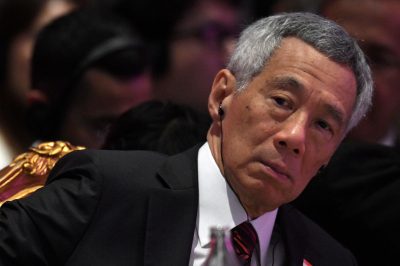Singapore politics appears confused, directionless and overwhelmingly defensive on nearly every front. The leadership transition — choosing the next prime minister — has dragged into its fifth year without resolution, and has now creaked to a halt that leaves Prime Minister Lee Hsien Loong (at 69) as a visibly tired placeholder, occupying the seat of power but not really leading.
Singapore’s Prime Minister Lee Hsien Loong attends the 22nd ASEAN Plus Three Summit in Bangkok, Thailand, 4 November 2019 (Photo: Reuters/Chalinee Thirasupa).
Widely publicised instances of provocative racist behaviour shocked the government and perceptions of economic injustice and insecurity are worrying it too, but neither have prompted any serious revision of policy settings and the issues continue to fester.
There are only two areas of policy where the government appears energised and focused: harassing critics and the opposition and managing COVID-19 and its economic challenges.
Only when it comes to attacking dissent and harassing the opposition does the government have clarity, mostly thanks to Minister for Home Affairs K Shanmugam. But harassing the opposition serves to highlight the government’s insecurity and introspectiveness. New restrictions on political and academic freedom under the guise of stopping foreign interference have confirmed the impression of a government on the defensive, only two years after a draconian ‘anti-fake news’ law that had already deadened public debate.
On the management of COVID-19, the record has been much less consistent and success more elusive. But regardless of one’s opinion of the government’s policy settings, there has never been any doubt about its determination to keep the economy open and functional, nor its comparative effectiveness in managing the pandemic. There’s also no question that the two men in charge — Finance Minister Lawrence Wong and Health Minister Ong Ye Kung — were engaged every inch of the way. Their proactive and decisive approach stands in sharp contrast to the leadership drift in the Prime Minister’s Office — policy backflips, blind spots and a two-year lockdown of foreign-worker dormitories notwithstanding.
Even though problems in race relations and perceptions of economic injustice and insecurity are arguably more central to Singapore’s long-term future than government efforts to control public discourse, they are not new. They are old issues that are being newly reported and newly acknowledged. The fact that each of them is now officially on the agenda demonstrates that the government has had more trouble containing the public conversation in 2021 than it did in the past – hence the need for increased levels of government control.
As COVID-19 dominates front-of-mind concerns, the five-years-and-counting leadership ‘transition’ has settled into Singaporeans’ back-of-mind concerns. Succession would have been long since settled, except that after spending four years winnowing the field of six candidates down to the one, the winner, Finance Minister Heng Swee Keat, dropped out of contention in April, having proven himself completely unsuited to the job — even after allowing for the fact that he collapsed from a stroke during a Cabinet meeting in May 2016.
Prime Minister Lee, who also collapsed in 2016 while delivering his televised National Day Rally Speech, now says that it is taking ‘a little longer’ to choose a leader than expected, but he is confident that the candidates will settle it by ‘consensus’ some time ‘before the next election’, which is not due until 2025.
It is difficult to believe that Lee and the candidates vying to succeed him are quite as laid back about the leadership of the country as Lee suggests. That would indicate that it is being handed to ditherers lacking courage and self-confidence. More likely, the matter is being settled quietly in the corridors of power with all the ruthlessness one would expect of successful career politicians, even if they are operating in a culture in which open displays of ambition are frowned upon.
Regardless of Byzantine intrigues conducted in air-conditioned rooms, the country opens another year with a leadership vacuum at the very top of the People’s Action Party (PAP) government. This is a remarkable lapse granted the importance that Singaporean political culture places on predictable and smooth transitions of leadership.
As recently as May 2021, former prime minister Goh Chok Tong launched his authorised biography boasting that, ‘carefully managed political succession has been the hallmark of Singapore politics since Independence. It has given us political predictability, stability and good governments.’ In the biography itself he is quoted as saying ‘we insist on a planned, systematic and smooth political transition for Singapore.’
Goh describes the chaotic transition as ‘a hiccup’, but if it is allowed to continue much longer, it will start to look like a breakdown in the government’s decision-making mechanisms at the highest levels. A breakdown that risks damaging the Singapore brand in the eyes of international investors and the PAP’s brand in the eyes of Singaporeans.
By Michael Barr / eastasiaforum
The views and opinions expressed in this article are solely those of the author and do not necessarily reflect the position of AsiaWE Review.




